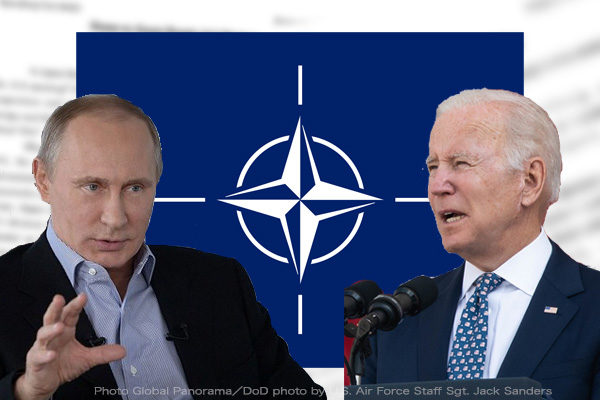As tensions continue between Russia and Western countries over Ukraine, we must not overlook the fact that Russian demands to the United States include some measures that could threaten Japan’s national security. While the U.S. Biden administration is unlikely to accept everything the Russians demand, Japan need to watch U.S.-Russia negotiations so as to prevent Washington from making any compromise that might harm Japan’s interests.
Russian demands to limit U.S. military deployments
On December 17, Russia published its proposed treaties with the North Atlantic Treaty Organization and the United States. Both treaties require NATO to refrain from expanding further and deny accession of Ukraine and other former Soviet republics to the organization.
However, the proposed treaty with the U.S. does not necessarily limit the regional scope of the treaty to Europe but could be interpreted as allowing Russia-requested U.S. security measures to be applied also to Asia. Japan cannot overlook this point.
The first paragraph of Article 5 in the proposed U.S.-Russia treaty says, “The Parties shall refrain from deploying their armed forces and armaments… in the areas where such deployment could be perceived by the other Party as a threat to its national security.” Russia may demand the U.S. to limit the deployment of U.S. forces in Japan based on this provision. The second paragraph of the article says, “The Parties shall refrain from flying heavy bombers… or deploying surface warships of any type… in the areas outside national airspace and national territorial waters respectively, from where they can attack targets in the territory of the other Party.” This paragraph could prohibit the U.S. from flying B-1B strategic bombers over the Korean Peninsula or dispatching warships to the Sea of Japan in the event of a Korean Peninsula crisis.
Article 6 says that “the Parties shall undertake not to deploy ground-launched intermediate-range and shorter-range missiles” in the areas “from which such weapons can attack targets in the national territory of the other Party.” If the treaty takes effect as it is, the U.S. would not be able to deploy intermediate-range missiles on the first island chain including Japan to counter China’s military expansion. The first paragraph of Article 7 says, “The Parties shall refrain from deploying nuclear weapons outside their national territories.” This means that the U.S. would be prohibited from introducing nuclear weapons into Japan in emergency even if the Japanese government accepts them.
Russia hates the Japan-U.S. alliance, claiming that the Japan-U.S. security treaty is an impediment to the conclusion of a Japan-Russia peace treaty. Russia might have attempted to take advantage of the tensions over Ukraine to take the teeth out of the Japan-U.S. security arrangements.
Tricky Russian diplomacy
After the U.S. held bilateral and multilateral talks with Russia on the Ukraine issue on January 10-13, U.S. Deputy Secretary of State Wendy Sherman dismissed the core Russian requests against the NATO expansion and Ukraine’s accession as “nonstarter.” However, the U.S. indicates its readiness to discuss other Russian requests such as restrictions on military exercises and the deployment of intermediate-range missile in Europe.
While Russia has demanded an official treaty with the U.S., the U.S. Senate is unlikely to ratify such treaty. So, Russia may compromise and accept an executive agreement that need not to be ratified by the Senate, Dmitri Trenin, director of the Carnegie Moscow Center, indicated in his article for the Foreign Affairs magazine.
Anyway, Japan should take care not to leave the Biden administration to bow to tricky Russian diplomacy to sign any unfavorable agreement for Japan. If necessary, Japan should express dissent to the U.S.
Yasushi Tomiyama is a senior research fellow and Planning Committee member at the Japan Institute for National Fundamentals and a former foreign news editor and bureau chief in Washington, D.C., London, and Bangkok for the Jiji Press.


